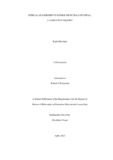
Please use this identifier to cite or link to this item:
https://hdl.handle.net/20.500.14301/420| Title: | Ethical Leadership of School Principals of Nepal: A Narrative Inquiry |
| Authors: | Sherchan, Bipin |
| Citation: | Sherchan,B.(2021).Ethical leadership of school principals of Nepal: A narrative inquiry |
| Issue Date: | Apr-2021 |
| Publisher: | Kathmandu University School of Education |
| School: | SOED |
| Department: | DOEL |
| Level: | M.Phil. |
| Program: | MPhil in Educational Leadership |
| Abstract: | Ethics, the conscious reflection of moral beliefs has been living with me as ambivalent since my childhood. I have a realization that it is the heart of moral society which determines the fate and future of the society. It is the study of right and wrong, good and bad. As I was oriented, education is a synonym of ethical efforts. Similarly, educational personalities are considered as exemplary figures of ethical intelligence. Among them, educational leaders are even more concerned because they are authorized persons who represent the motive of education. Therefore, I honor them as a living book of ethical knowledge. But unfortunately, they are criticized for their unethical activities. Research also reveals that they have low moral clarity in their performance. I wonder how it could be. Why are they confused? If it is so, then how can we expect moral and ethical awareness from education? Ethics has been considered as a tool of professional development of leadership. Various studies are carried out for effective ethical leadership but I came to realize the dearth of research in the area of lived experiences of leaders. As I assume, their lived world may torch the light in this ambivalent phenomenon. With these queries and expectations, I carried out this study as my ethical responsibility. Drawing the concept of ethical leadership, this study explores the lived experiences of school leaders (principals) in their world of leadership. The main purpose of this study was to explore how school principals have experienced ethical leadership, how they narrate their lived experiences on principles of ethical leadership and why they have actions. This study is fabricated with a narrative approach under the interpretive paradigm. Four principals were purposely interviewed from the institutional schools of the Kathmandu valley as my research participants. Their narratives depicted three principles of ethical leadership. They were (i) ethics of care, (ii) ethics of justice, and (iii) ethics of critique. Adopting the procedure of recording, transcription and translation of the information, twelve stories were selected from the various stories. I have unfolded the stories under the three themes. Then after, I have gone through analyzing, interpreting and meaning making processes to construct my understanding of each theme. While doing so, I draw the epistemological beliefs on the meaning of ethical leadership and quality of ethical leaders as my constructed meaning. Moving forward, in the process of theoretical discussion, my explored meanings were discussed with literature and developed with value-based leadership theory. The quality standards of the study steered through temporality, sociality and spatiality of the narrated events. I was alert and sincere on ethical consideration in every step of the study. This study may spark some knowledge of truth as we are living. The knowledge constitutesmultiple realities as I pass through. Now, connecting with the reality of the study, ethical leadership has multilayered dimensions and abstract ways to deal with. Treating every individual as a unique human being is a fuel of ethical leadership. Accepting and respecting the realities of each member is a strong and organic thread of effective ethical leadership. Here, being specific, ethical leadership is a process of valuing the individual dignity aligning with institutional value and social values. When people feel loved, cared, secured and empowered, then they will be capable and competent enough to distinguish right from wrong and good from bad. Humility, care, love, responsibility, honesty, plan, challenge and motivation are explored as qualities and characteristics of an ethical leader. The current research may have a deep value on developing the ethical value-based school environment and nurturing the moral society. It also sheds light on the existing phenomena of ethical consciousness, premises and practices in educational leadership. It may also stand as a mirror of effective ethical leaders. I have set three implications for my study. First, valuing humanity rather than applying the complicated strategies in effective leadership practice. Second, rules and policies required to address the voices of concerned people. Eventually, it shows the ways to further study in exploring the ethical strength in social/cultural beliefs, and indigenous knowledge. In general, it inspires to value human dignity for the overall prosperity of the moral society. |
| URI: | https://hdl.handle.net/20.500.14301/420 |
| Appears in Collections: | Dissertation |
Files in This Item:
| File | Description | Size | Format | |
|---|---|---|---|---|
| Mphil Thesis 2021_bipin.pdf | 641.47 kB | Adobe PDF |  View/Open |
Items in DSpace are protected by copyright, with all rights reserved, unless otherwise indicated.